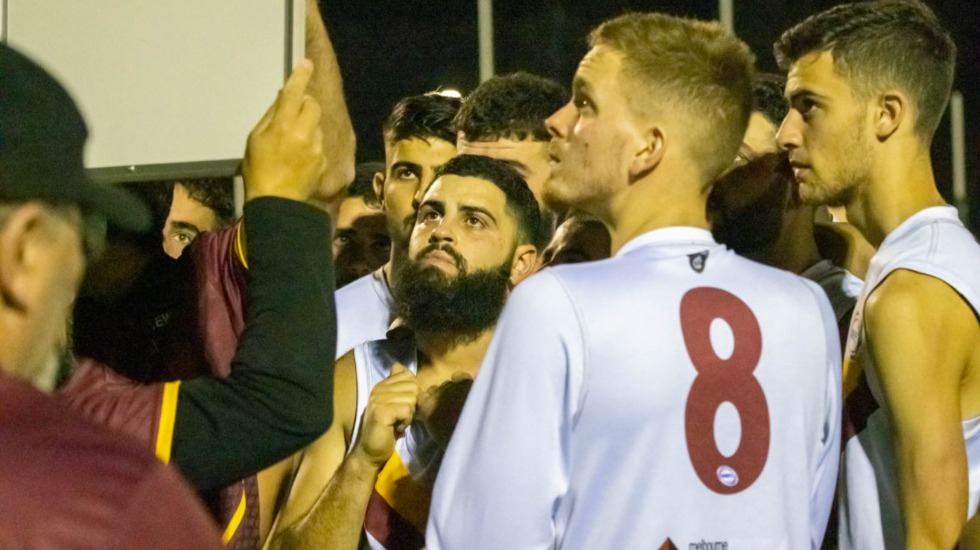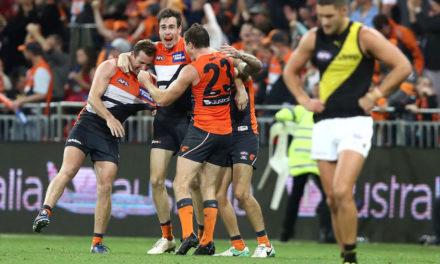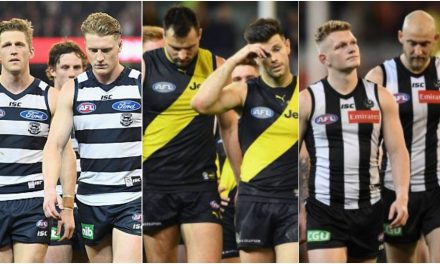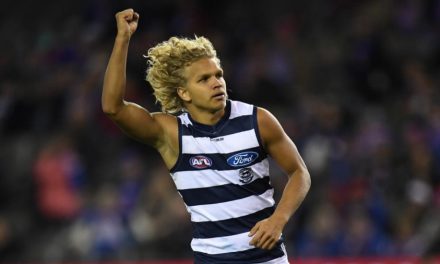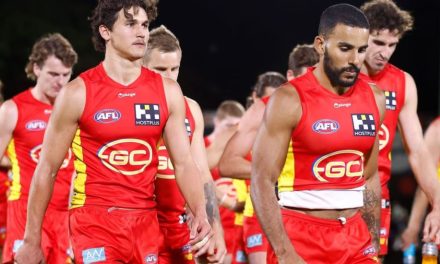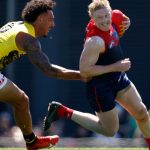There are few non-practising Muslims in Newport’s team, which presents a challenge during Ramadan. Photo: NEWPORT FC
It may have long since died out at AFL level, but in local football, both teams going back to the clubrooms and sharing a beer after the game is as much a part of the experience as the smell of Deep Heat in the changerooms or the sound of players banging the mud off their boots after leaving the field.
And so it was after last Saturday evening’s Western Region Football League division two clash at Wyndhamvale between the Falcons and the visiting Newport Football Club.
After a tight contest, which Wyndhamvale won by a goal, both teams retired back to the clubrooms, but only the home side’s players were after a beer. The visitors were more interested in having a feed. They were starving.
Last weekend signalled the halfway point of the Holy Month of Ramadan, where followers of Islam fast during daylight hours, from sunrise to sunset.
Among the more than one billion participants worldwide are nearly all the players, coaches, administrators and supporters of the Newport Football Club from Melbourne’s inner-west. This means no food or water for the players on match days. And playing a rare night game only added to challenge.
For their seniors, it meant not only fasting all day, but extending that fast for even longer than usual to take on the flag favourites away from home. Despite not getting the win, their efforts didn’t go unnoticed. Awaiting the players in the clubrooms was a special Iftar meal Wyndhamvale had prepared so their hungry opponents could finally break their fast.
It was an act of generosity and solidarity that left Newport president Marwan Abou-Zeid stunned.
“Honestly it was just really, really good. It was really amazing. It just was unexpected”, he said. “The effort that Wyndhamvale went to to accommodate us was just, it was just … (his voice trails off before finding the appropriate phrase) I couldn’t speak highly enough of them.”
It’s a far cry from the days when Newport was not only unwelcome in opposition clubrooms, but in the WRFL itself.
A previous incarnation of the club was notorious for bad behaviour both on and off the field, resulting in it being kicked out of the competition in the late 1990’s.
The club returned with junior teams in 2004, before a senior team re-joined the league in 2016, drawing heavily on the large Lebanese Muslim population in the Newport area for players.
Most weeks there are only two or three non-practising Muslims in the starting 22, and with Ramadan always falling during football season, the club faces an annual month-long challenge unique among footy clubs in Melbourne.
It’s something which has earnt Newport the respect of rival clubs, but which it is also keen to avoid using as an excuse.
As Abou-Zeid explains when asked if the extra-long fast has contributed to Saturday night’s defeat, the situation isn’t as challenging as at it seems.
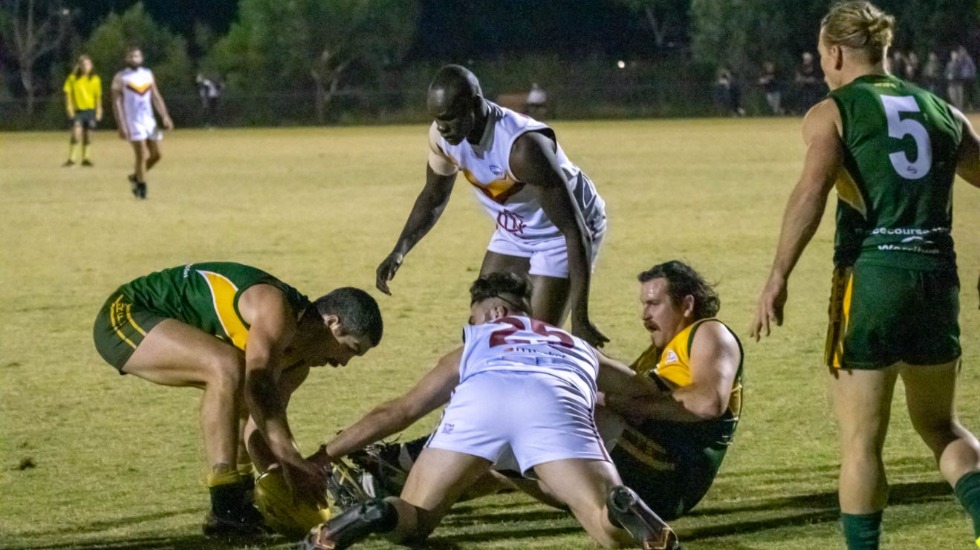
Action from Newport’s game last Saturday night against Wyndhamvale. Photo: NEWPORT FC
“I don’t think it affected them really, I mean, they were able to drink water and have some dates, which obviously give them a bit of energy (fasting ends at 5.45pm and the match began at 7pm) so I didn’t hear any complaints from anybody in terms of that was hard or, you know: ‘Jeez, we shouldn’t do this again.’ They were pretty happy with it.”
Abou-Zeid says the perception of playing through Ramadan is much worse than the reality, and that, if anything, it actually improves their performance:
“If you don’t understand it and you don’t know much about it, you think it’s really hard, but when you’ve done it all your life, it (fasting) can become second nature,” he says.
“I actually find that they play a lot better in Ramadan, than they do outside of Ramadan, purely because they don’t eat heavy meals before games. They can’t, because obviously they’re fasting, but also, you know, their last meals are at about 5.30am, they fill up on their fluids and they come into the game light, so they’re really bouncing.
“Probably by the end of the game they do get tired. I think you’ll find maybe towards the end of Ramadan your body has sort of sapped all the energy out of you. It probably gets hard, but the first two or three weeks are not that bad.”
It’s a theme that club captain Munir El Houli picks up on when describing the galvanising effect the month has on the playing group.
PLEASE HELP US CONTINUE TO THRIVE BY BECOMING AN OFFICIAL FOOTYOLOGY PATRON. JUST CLICK THIS LINK.
“Having another 20 players doing the same thing, it drives you a bit, because you see other people struggling, so you kind of lift each other and just move forward together,” he says.
“We bring up a lot of stuff that’s got to do with our religion, you know, having God on our side on the weekend and being able to fight harder, sometimes even harder than we would when we’re when we’re not fasting. Obviously, ideally, you’d want to get that hydration and your meals in before a game but we’ve been able to find that drive, not just with other players, but through our religion as well”.
For El Houli, a local junior who returned to the club two years ago after a stint at nearby Altona, playing at a majority Muslim club during Ramadan has its benefits beyond just the sense of community. In a practical sense, it allows the club to alter training times to fit with the breaking of fast and put in place match day protocols that juggle religion and football, something he found difficult at other clubs where he was often the only Muslim.
“We get to the ground (on match days) and there’s a prayer and then, whilst we’re playing our game (afternoon prayers) fall at half-time, which is really good, so we say to the players, if you are going to pray at half-time, just get your pants (long pants are always worn during prayer) ready so once we walk in, we put the pants on, and we pray straight away, there’s no wasting time. You do everything you need to do for from the religion side of things and then also football.
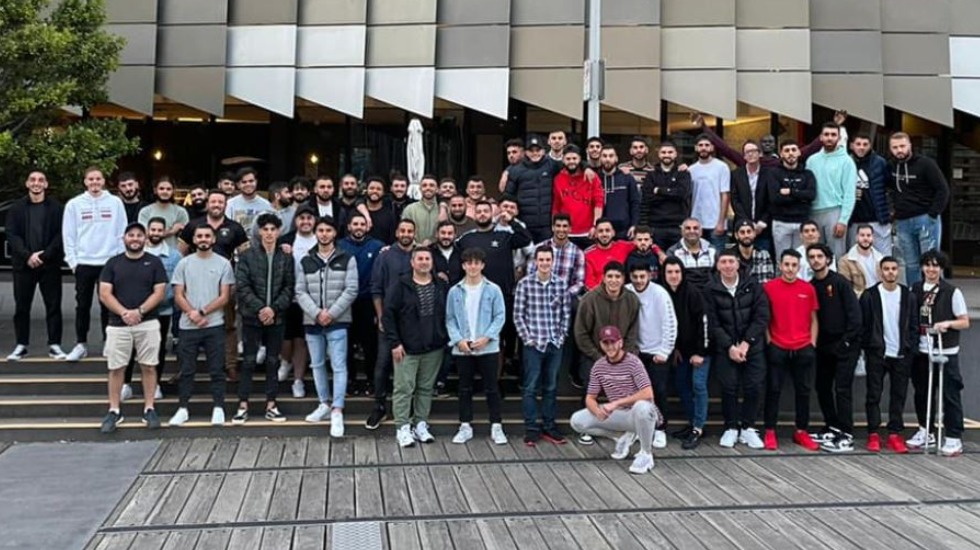
Newport Football Club draws heavily on the large Lebanese Muslim population in the local area for players. Photo: NEWPORT FC
“It was more difficult to do that at other clubs, sometimes being on your own. Even not feeling confident enough to go up to the coach and say: ‘Look, I’ve got to pray now, is it OK if I step out?’ I didn’t want other players to think I’m getting different rules to others.”
At Newport, it’s now non-Muslims who find themselves in the minority and having to adjust to the reality of Ramadan rather than the other way around. Among them is assistant coach Josh Russo, who joined the club at the urging of senior coach and former Altona premiership teammate Ziggy Kadour.
He says the changes he’s had to make for Ramadan pale compared to the sacrifices made by the players.
“Logistically, the timing of things doesn’t naturally work around a football club, but you adjust, you accommodate, you support,” he says. “Instead of going on a five-minute rant at half-time, it becomes at two-and-a-half minute rant.
“You’re very mindful of the situation and understanding and respectful, so to make a little adjustment from my end when you see what they do on a daily basis for a long period of time, then it’s pretty easy to be honest”.
And according to Russo, being the odd one out has some unexpected perks. “I didn’t get a contract this year so I get paid in food” he laughs.
“The generosity and the kindness of the boys, it doesn’t matter that I’m a coach, I get deliveries at my door just because that’s what Ramadan is about, it’s a time of giving and they see me as someone that is appreciative and accepting, and they offer and (laughing) I take it.”
Ramadan is in now in its final week, the period when Marwan Abou-Zeid thinks the going is toughest.
Newport is away to Glenorden on Saturday, and a win will see it go 3-1 for the month and firmly entrenched in the division’s top three. Players will no doubt use their faith as a source of inspiration for the final stretch, but if they’re looking for a tangible example to follow, they could do worse than watch Richmond on Friday night against Geelong, and in particular Tigers star and member of the local Lebanese community, Bachar Houli.
“He’s a local boy, he’s related to half the boys here” Abo-Zeid laughs.
As another devout Muslim observing Ramadan, Houli has been down to the club to advise players on how to balance football and religion across the month. His best-on-ground performance last week against the Western Bulldogs suggests Houli has got the balance right.
For Abou-Zeid, Houli’s influence during Ramadan extends far beyond telling the players how to train or what to eat.
“He’s a family friend of all of ours, a great role model,” he says. “And I’ve got to give him credit, because I’m finding now a lot of people asking the question, almost like they know: ‘Oh you’re in Ramadan?’ I really put it down to him being open about it. And that helps in terms of our boys not being ashamed of their identity … to be proud Australian Muslim boys.”

